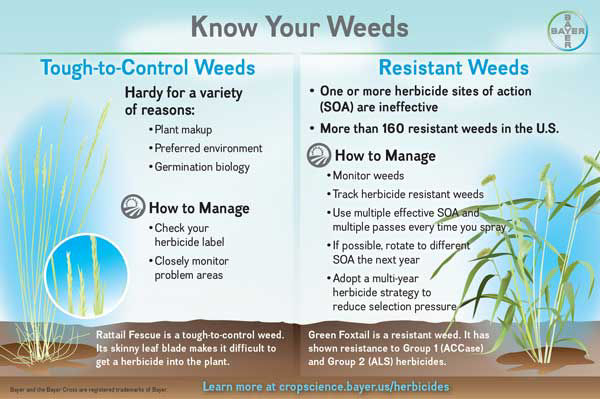An Integrated Approach to Manage Weeds
October 19, 2016
Weeds must be kept in check with a proactive, integrated weed management approach. Zero tolerance for tough-to-manage and resistant weeds is the best way to keep fields in production and achieve maximum yield.
A one-season weed control approach, using one herbicide or single mode of action, won’t prevent the deposit of resistant seeds into the soil seedbank. A combination of multiple, effective herbicide sites of action, as well as cultural practices such as crop rotation and mechanical weed-control methods, should be employed to manage or delay resistance.
Best Management Practices
Some recommended best management practices (BMPs) to consider are:
- Rotate crops
- Rotate herbicide-tolerant traits
- Use multiple, effective herbicide modes of action
- Know your weeds, know your fields
- Start with clean fields
- Stay clean – use residual herbicides whenever possible
- Apply herbicides correctly
- Control weed escapes
- Zero tolerance of weeds in the soil bank
- Clean equipment

How Weeds Spread
These BMPs are aimed not only to eliminate existing weeds, but also to help prevent the spread of herbicide-resistant seeds. A single herbicide-resistant plant can produce and deposit an extraordinary number of seeds into the soil seedbank – a single Palmer amaranth commonly produces 1 million seeds; a waterhemp plant produces 250,000. These seeds can spread rapidly over a large number of acres and remain viable in the soil for two to four years, or more.
If driver weeds such as Palmer amaranth, waterhemp, kochia and giant ragweed develop resistance in a field, farmers face additional expenses needed for control, such as unplanned herbicide applications, hand weeding and more cultivation. In extreme cases, total crop loss is the ultimate cost if an integrated weed management approach to combat them isn’t used.
Additional Bayer Solutions
We also have a broad portfolio of herbicides to combat tough-to-control and resistant weeds. Before applying any herbicide, please read the entire label for the best possible results and to confirm that the product is effective on the weeds you wish to control. Not every product is suitable for every situation, and use of the correct application technique will ensure the best results.
Disclaimer
Always read and follow pesticide label directions, insect resistance management requirements (where applicable), and grain marketing and all other stewardship practices.